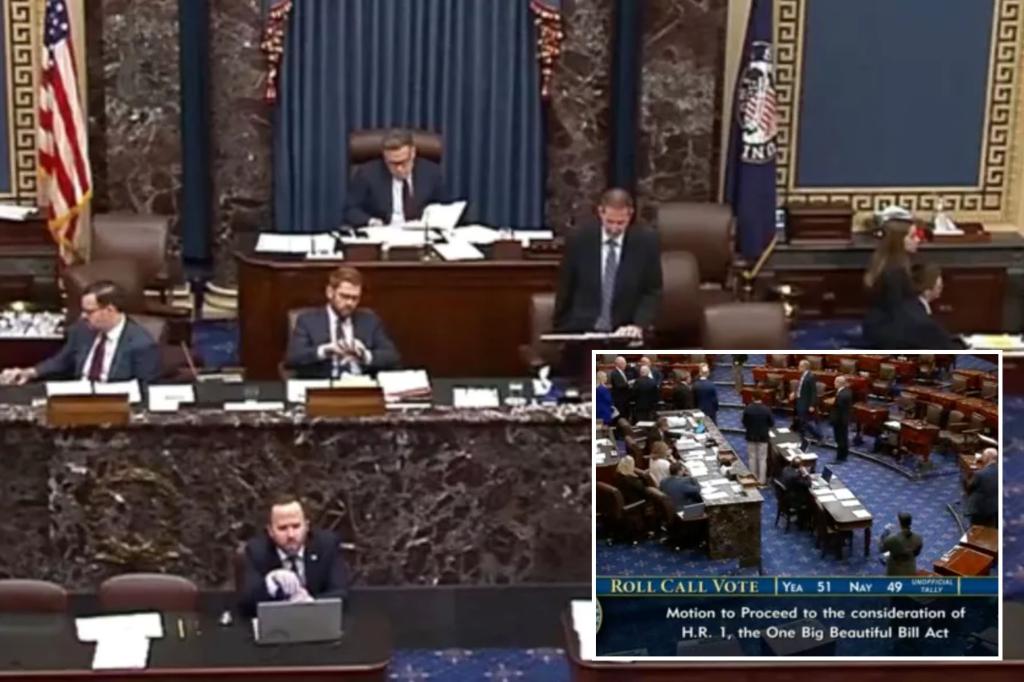The Senate voted Saturday to launch into debate on President Trump’s “big beautiful” spending bill, after Republican leaders spent hours working to gain enough support to approve the 940-page document.
The multi-trillion dollar bill narrowly advanced in a 51-49 procedural vote, despite opposition from two Republican lawmakers who joined their Democratic colleagues in an attempt to block the measure from reaching the Senate floor.
Senators Thom Tillis (R-NC) and Rand Paul (R-KY) were the holdouts after they publicly declared that they wouldn’t be backing the bill in its current form.
Wisconsin GOP Sen. Ron Johnson initially voted against the procedural motion but flipped at the eleventh hour.
Vice President JD Vance had arrived at Capitol Hill earlier in the night and remained on standby ready to cast his tie-breaking vote as Republicans remained divided throughout the nearly four hour proceeding.
Debate will now begin on the spending bill – and that could take hours as New York Democratic Sen. Chuck Schumer has promised to have the nearly 1,000-page measure read before a final vote on passing it can happen.
Trump has lobbied for House and Senate Republicans to fast-track the legislation so it lands on his desk by his self-imposed July 4 deadline.
The measure would make Trump’s 2017 tax cuts permanent, end taxation on tips and overtime, boost border security funding and scrap green-energy tax credits passed during the Biden administration.
The legislation would also have to raise the debt ceiling by roughly $5 trillion in order to cram in all the provisions.
Trump warned potential dissenters earlier Saturday that refusal to support his bill would be an “ultimate betrayal” – later lashing out at Tillis on social media for making a “big mistake” and threatening to primary him for turning his back on the spending bill.
“Numerous people have come forward wanting to run in the Primary against ‘Senator Thom’ Tillis,” the commander in chief posted on Truth Social as the vote stalled late Saturday night.
“I will be meeting with them over the coming weeks, looking for someone who will properly represent the Great People of North Carolina and, so importantly, the United States of America. Thank you for your attention to this matter!”
After the vote passed, the president also hurled criticism at Sen. Paul, the other Republican holdout.
“Did Rand Paul Vote ‘NO’ again tonight? What’s wrong with this guy??? DJT,” the commander in chief wrote on Truth following the vote.
The latest version of Trump’s signature bill was released to Senate lawmakers late Friday night and includes a vast majority of the policies the House narrowly approved in May, but also includes key changes to programs such as Medicaid.
It also reduces federal spending for the Supplemental Nutrition Assistance Program (SNAP).
Republicans from states with large rural populations have long opposed a reduction in state tax revenue for Medicaid providers including rural hospitals.
The newly released legislation delays that reduction and includes a $25 billion fund to support rural Medicaid providers from 2028 to 2032.
The revised bill raises the cap on federal deductions for state and local taxes, known as SALT, to $40,000 with an annual 1% inflation adjustment through 2029, after which it would fall back to the current $10,000.
It would also phase the cap down for those earning more than $500,000 a year. The SALT deduction has been a top priority of lawmakers from New York and other high-tax states.
Senate Republicans also removed a “revenge tax” on some foreign companies and investors — which had Wall Street concerned — after Treasury Security Scott Bessent made the request.
Additionally, the bill includes a quicker phase out on renewable energy tax credits for wind and solar energy projects.
The new measure requires such projects to be “placed in service” by the end of 2027 to receive incentives, rather than being under construction by that time.
The latest bill version also adds back a plan to sell up to 1.2 million acres of Interior Department land for housing and “community development” in 11 western states.
The measure, which could raise as much as $6 billion, has come under fire from some Republican senators representing affected states.
The House passed a version of the bill by a single vote on May 22 – but the lower chamber will have to approve the measure again after the Senate finalizes its changes.
Read the full article here

